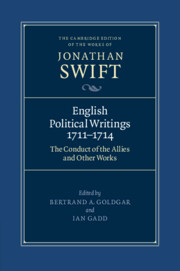Book contents
- Frontmatter
- Contents
- List of Illustrations
- General Editors’ Preface
- Acknowledgements
- Chronology
- List of Abbreviations
- Note
- Introduction
- The Conduct of the Allies
- Some Advice Humbly Offer’d to the Members of the October Club
- Some Remarks on the Barrier Treaty
- The New Way of Selling Places at Court
- Some Reasons to Prove . . . In a Letter to a Whig-Lord
- It’s Out at Last: Or, French Correspondence Clear as the Sun
- A Dialogue Upon Dunkirk, Between a Whig and a Tory
- A Hue and Cry After Dismal
- A Letter From the Pretender, to a Whig-Lord
- A Defence of Erasmus Lewis, or The Examiner (2 February 1713)
- Vote of Thanks by the House of Lords (9 April 1713) and The Humble Address of the . . . Lords (11 April 1713)
- The Importance of the Guardian Considered
- The Publick Spirit of the Whigs
- A Discourse Concerning the Fears From the Pretender
- Some Free Thoughts Upon the Present State of Affairs
- Some Considerations Upon the Consequences Hoped and Feared from the Death of the Queen
- Contributions to the Post Boy and the Evening Post
- Textual Introduction and Accounts of Individual Works
- Textual Introduction Ian Gadd
- The Conduct of the Allies: Textual Account
- Appendix: Transcripts of the British Library Manuscripts of the Vote of Thanks and The Humble Address of . . . the Lords
- Bibliography
- Index
Textual Introduction Ian Gadd
Published online by Cambridge University Press: 02 September 2021
- Frontmatter
- Contents
- List of Illustrations
- General Editors’ Preface
- Acknowledgements
- Chronology
- List of Abbreviations
- Note
- Introduction
- The Conduct of the Allies
- Some Advice Humbly Offer’d to the Members of the October Club
- Some Remarks on the Barrier Treaty
- The New Way of Selling Places at Court
- Some Reasons to Prove . . . In a Letter to a Whig-Lord
- It’s Out at Last: Or, French Correspondence Clear as the Sun
- A Dialogue Upon Dunkirk, Between a Whig and a Tory
- A Hue and Cry After Dismal
- A Letter From the Pretender, to a Whig-Lord
- A Defence of Erasmus Lewis, or The Examiner (2 February 1713)
- Vote of Thanks by the House of Lords (9 April 1713) and The Humble Address of the . . . Lords (11 April 1713)
- The Importance of the Guardian Considered
- The Publick Spirit of the Whigs
- A Discourse Concerning the Fears From the Pretender
- Some Free Thoughts Upon the Present State of Affairs
- Some Considerations Upon the Consequences Hoped and Feared from the Death of the Queen
- Contributions to the Post Boy and the Evening Post
- Textual Introduction and Accounts of Individual Works
- Textual Introduction Ian Gadd
- The Conduct of the Allies: Textual Account
- Appendix: Transcripts of the British Library Manuscripts of the Vote of Thanks and The Humble Address of . . . the Lords
- Bibliography
- Index
Summary
In what remains the only article specifically focused on Swift's relationship with the London book trade during the reign of Anne, Michael Treadwell wryly noted that ‘[p]ast Swift scholars and editors … far from indulging in the excesses of compositor analysis … can hardly be accused of narrow bibliographical principles, or indeed, of many bibliographical principles at all’ (‘Swift's Relations’, pp. 2–3). Treadwell was writing in 1983 and while, twodecades later, there has been further bibliographical investigation of Swift's more well-known works, most notably Gulliver's Travels, the attention paid to Swift and the London book trade of the early eighteenth century has remained, with a few honourable exceptions, rather cursory. This, though, is not surprising. While The Conduct of the Allies probably ranks as Swift's most immediately influential and popular work, with 11,000 copies sold within two months, its bibliographical complexities – although much more tangled than previous scholars have acknowledged – are eclipsed by those presented byATale of a Tub and Gulliver's Travels. Similarly, given the account presented by Herbert Davis in his introductions to volumes six and eight of Swift's prose works (mentioning Barber by name only in the latter), it may seem that, apart from the success of Conduct and the inconclusive prosecutions following the publication of The Publick Spirit of the Whigs, the bibliographical story of Swift's output during those years is both straightforward and uninteresting. It is the aim of this introduction and the textual accounts provided for each work later in this volume to prove the case otherwise.
Swift, Barber and Morphew
As Treadwell observes, although Defoe and Pope both ‘knew the trade far better than did Swift’, Swift's relations with the London book trade were ‘many and various’ (‘Swift's Relations’, pp. 2, 1). Between 1701–9, Swift's London publisher of choice was Benjamin Tooke, junior, but with the political ascendance of the Tories in late 1710 Swift's writings changed – and so did his printer and publisher. Of the eleven works included in this volume that were published between 1711 and 1714 (excluding the Vote of Thanks, The Humble Address of the … Lords (11 April 1713) and the contributions to periodicals), seven were definitely printed and published by John Barber. Born in 1675, Barber had established himself as a master printer in London in 1701, and by 1710 was one of the leading printers for the Tory party.
- Type
- Chapter
- Information
- English Political Writings 1711–1714'The Conduct of the Allies' and Other Works, pp. 327 - 340Publisher: Cambridge University PressPrint publication year: 2008

